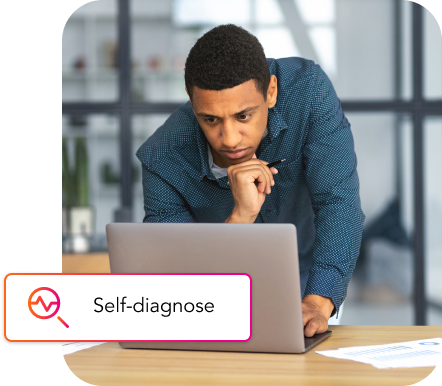
Intelligent self-service refers to the new generation of self-service solutions. These solutions are changing the paradigm over the old way of doing it. The highly structured classification and prescriptive knowledge bases are being replaced (or fronted) with virtual customer assistants (VCA’s) or chatbots. The old IVR phone trees (“press one for billing, press two for services…”) are being replaced by graphical or digital alternatives. Automation technology, often thought to be the exclusive domain for organizational automation, is now being utilized to assist customers.
Rapid technology advancement in machine learning and artificial intelligence has helped propel these solutions from ‘academic novelties’ into full-featured cost-effective service channels.
What will become apparent is that the best self-service implementations take a holistic approach offering the right solution at the right time. We will start by defining the core components: VCA’s / Chatbots, Digital Self-service and Automation. Automation is largely an enabling component for self-service but warrants its own discussion.
Virtual Customer Assistants or Chatbots
Virtual customer assistants are perhaps the most widely known self-service solution despite being the newest technology. This is in part due to the hype, but largely due to the tremendous achievements and success that chatbots are delivering.
Virtual customer assistants allow a customer to be engaged in a manner that is more natural and more transnational than simply searching through a knowledge base could ever be. Typical VCA’s can be either workflow based, AI based or a combination of both:
- AI based chatbots recognize customer inquiries expressed in natural language (“Why is my bill so high?”). In addition, AI is used in resolving the actual inquiry or transaction itself.
- Workflow based chatbots guide customers through a flow and present a defined set of options to select from.
- Combination AI and workflow combine both technologies to provide the most flexible virtual customer assistants and typically provide the lowest effort to the customer. Obvious, suggested, or frequently used responses can be presented, but natural language is always available to allow deviation from the predefined flow.
Digital Self-service
Digital self-service refers to transitioning customers on the voice channel or phone into a digital medium where they can utilize deployed self-service solutions (such as a chatbot) to resolve their inquiry. In essence, voice callers are smoothly transitioned into a fully digital channel. This should be distinguished from voice recognition solutions which keep the user in the analog channel.
The benefit of transitioning voice callers into the digital channel include the fact that your investment in chatbot technology is extended to voice callers, and the voice-to-digital transition helps educate the non-digital natives on the lower effort provided by digital channels. These solutions are sometimes called Visual IVR or Intelligent IVR.
Customer Service Automation
Automation technology has been gaining momentum as it continues to demonstrate its ability to drive efficiency into both front-office (contact center) and back-office processes. However, automation is a key enabler of successful self-service initiatives. To make chatbots truly valuable, they need to be transactional. And to be transactional within complex enterprise environments inevitably requires a degree of automation technology. Data needs to flow across multiple systems and the feasibility of doing that exclusively in an API driven manner is small. Automation enables true transactional chatbots and is key to driving a successful self-service initiative.
About Uniphore
Uniphore’s automation expertise and IP within customer service operations continues to deliver end-to-end customer service automation solutions to global enterprises helping them move further down an autonomous CX path. From guiding the contact center agents and automating their manual tasks to fully automated customer self-service solutions, Uniphore automates interactions while improving customer experience.
Supporting all channels and systems deployed in high volume contact centers to low volume call centers, Uniphore customer service automation solutions are designed to improve customer self-service and agent-assisted service. Each solution can be deployed as a standalone or incorporated as part of a suite through the Robotic Automation & AI Hub we refer to as “Interact.”
As a leader in customer service and contact center solutions, Uniphore’s award winning solutions enable organizations, all around the world, to provide the absolute highest quality of service for their customers.
Decision Guide for Intelligent Self-Service
This guide aims to help with formulating your self-service plan and to understand the state of the industry, navigate pitfalls and show how to roll out self-service projects while also minimizing risk.
[About the author] Dylon Mills is the Director of Marketing Content Strategy & Development at Uniphore. As such, Dylon’s main responsibilities are to strategize, create and deliver content for Uniphore’s product portfolio that align with the global Go-To-Market strategy, corporate positioning, and marketing campaigns. Dylon’s prior work experience includes Product Management at one of the top Fortune 500 Technology companies, Symantec Corporation. Outside of work, Dylon enjoys problem-solving and any project that includes building/tinkering with tools. Dylon holds a BS Consumer Economics from the University of Georgia.
Dylon Mills is the Director of Marketing Content Strategy & Development at Uniphore. As such, Dylon’s main responsibilities are to strategize, create and deliver content for Uniphore’s product portfolio that align with the global Go-To-Market strategy, corporate positioning, and marketing campaigns. Dylon’s prior work experience includes Product Management at one of the top Fortune 500 Technology companies, Symantec Corporation. Outside of work, Dylon enjoys problem-solving and any project that includes building/tinkering with tools. Dylon holds a BS Consumer Economics from the University of Georgia.



